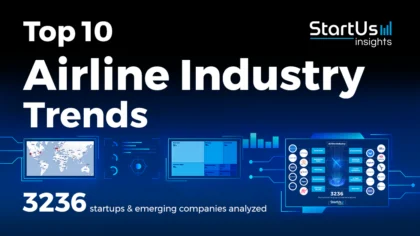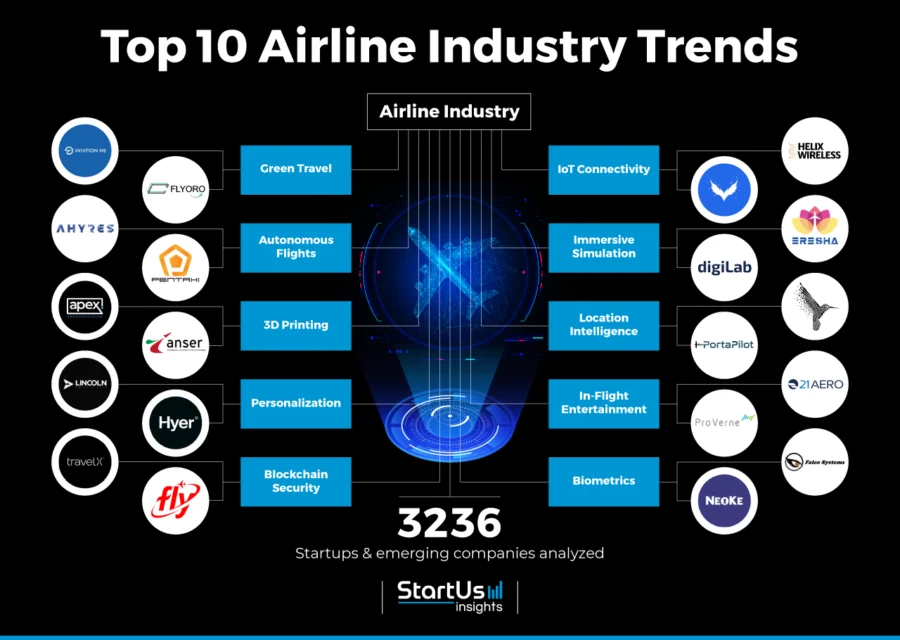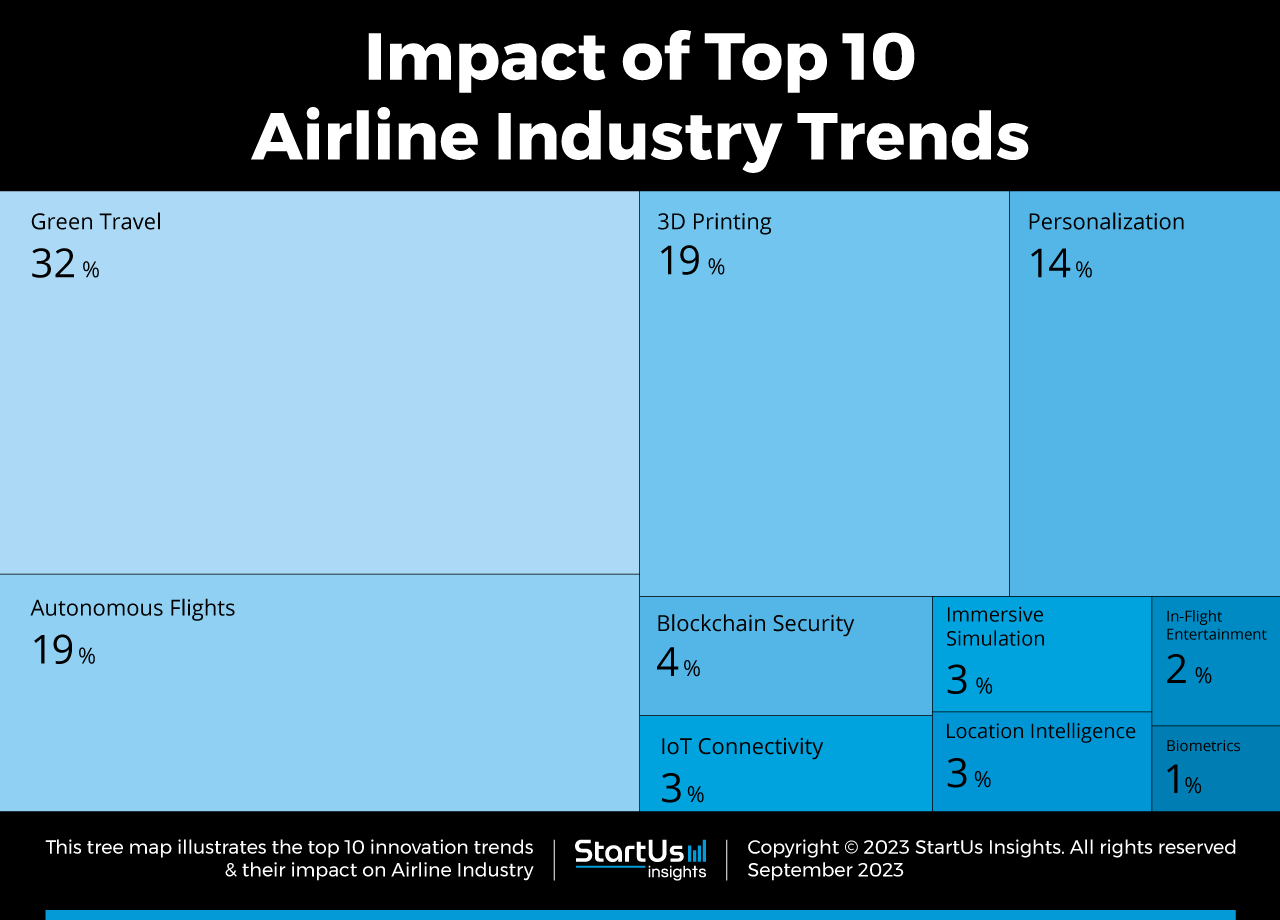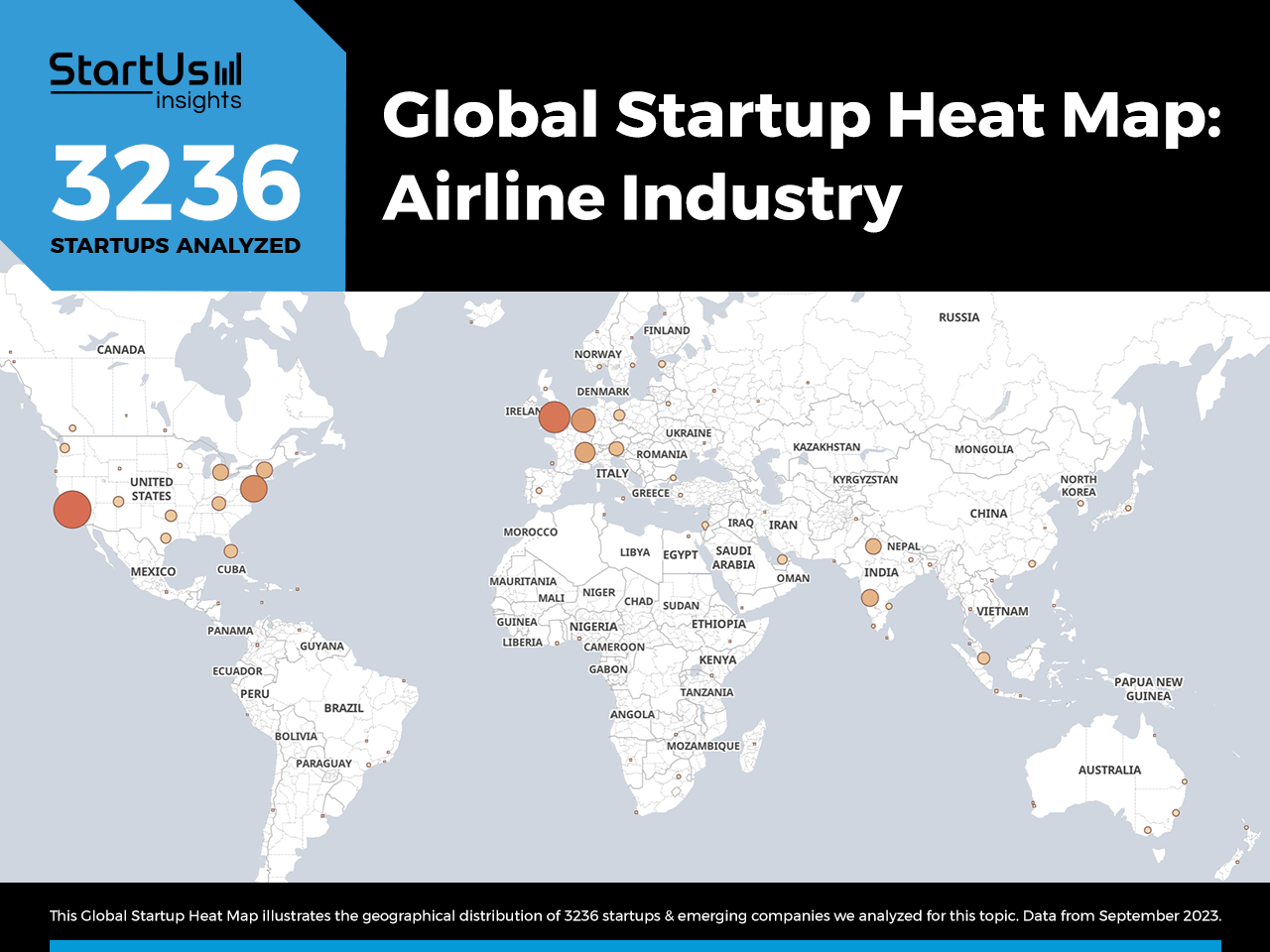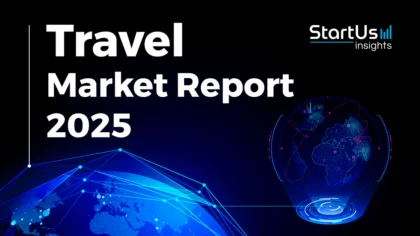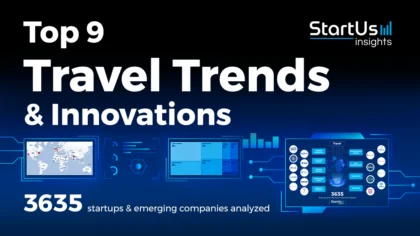Accelerate Productivity in 2025
Reignite Growth Despite the Global Slowdown
The airline industry, a pivotal component of global transportation, is rapidly evolving with the integration of cutting-edge technologies and innovative strategies. Emerging airline industry trends enhance passenger experiences and operational efficiency as well as reduce environmental impact.
The sector is witnessing a transformation fueled by technologies such as autonomous aircraft, Internet of Things (IoT), artificial intelligence (AI), augmented reality (AR), and more. They are optimizing travel convenience and also enabling airlines to explore additional revenue streams. Read more to explore the top technology trends in airlines and how they impact your business.
What are the New Trends in the Airline Industry?
- Green Travel
- Autonomous Flights
- 3D Printing
- Personalization
- Blockchain Security
- IoT Connectivity
- Immersive Simulation
- Location Intelligence
- In-Flight Entertainment
- Biometrics
Methodology: How We Created the Airline Industry Trend Report
For our trend reports, we leverage our proprietary StartUs Insights Discovery Platform, covering 5M+ global startups, 20K technologies & trends plus 150M+ patents, news articles, and market reports.
Creating a report involves approximately 40 hours of analysis. We evaluate our own startup data and complement these insights with external research, including industry reports, news articles, and market analyses. This process enables us to identify the most impactful and innovative trends in the airline industry.
For each trend, we select two exemplary startups that meet the following criteria:
- Relevance: Their product, technology, or solution aligns with the trend.
- Founding Year: Established between 2020 and 2025.
- Company Size: A maximum of 200 employees.
- Location: Specific geographic considerations.
This approach ensures our reports provide reliable, actionable insights into the airline innovation ecosystem while highlighting startups driving technological advancements in the industry.
Innovation Map outlines the Top 10 Current Trends in the Airline Industry & 20 Promising Startups
For this in-depth research on the Top Airline Industry Trends & Startups, we analyzed a sample of 3200+ global startups & scaleups. The Airline Industry Innovation Map created from this data-driven research helps you improve strategic decision-making by giving you a comprehensive overview of the airline industry trends & startups that impact your company.
Tree Map reveals the Impact of the Top 10 Airline Industry Trends in 2025
Based on the Airline Innovation Map, the Tree Map below illustrates the impact of the 10 Emerging Airline Industry Trends in 2025. Startups and scaleups are developing solutions to improve the customer experience and safety in airlines. One of the major trends in the airline industry is the use of sustainable materials and fuels to enable climate-friendly travel. Autonomous flights are also gaining popularity to provide a safe travel experience by eliminating human errors.
Global Startup Heat Map covers 3236 Airline Startups & Scaleups
The Global Startup Heat Map showcases the distribution of 3200+ exemplary startups and scaleups analyzed using the StartUs Insights Discovery Platform. It highlights high startup activity in the US and the UK, followed by the rest of Western Europe. From these, 20 promising startups are featured below, selected based on factors like founding year, location, and funding.
Want to Explore Airline Innovations & Trends?
10 Emerging Airlines Industry Trends in 2025
1. Green Travel
Sustainable travel is a growing trend in the airline industry, characterized by dedication to environmental sustainability. Airlines are actively embracing eco-conscious practices such as the utilization of sustainable aviation fuels (SAFs) and the integration of energy-efficient technologies. This trend is driven by a collective commitment to curbing carbon emissions, enhancing environmental responsibility, and addressing customer demand.
Key initiatives include SAFs that reduce greenhouse gas emissions from fuel combustion, alongside recent strides in electric and hybrid-electric aircraft technology. Improved air traffic management further minimizes fuel consumption, contributing to greener air travel. Airlines are increasingly recognizing the significance of these sustainable practices, both for ecological stewardship and economic resilience.
Airlines like Emirates and Etihad have implemented SAF on flights to destinations such as Singapore, Amsterdam, London, and Japan. Additionally, the global aviation industry aims to reach net-zero carbon emissions by 2050, as per IATA’s Fly Net Zero commitment.
The global sustainable aviation fuel market was valued at USD 1.7 billion in 2024 and is estimated to grow at a compound annual growth rate (CAGR) of 46.2% from 2025 to 2034.
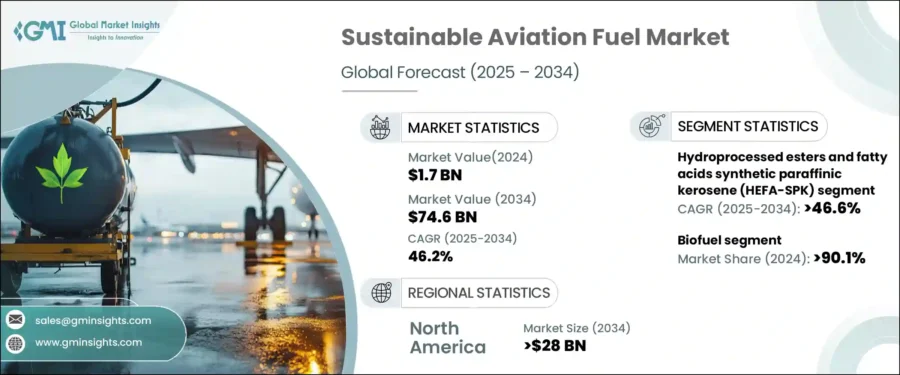
Credit: Global Market Insights
Aviation H2 makes Hydrogen Airplanes
Australian startup Aviation H2 builds hydrogen planes and also retrofits existing aircraft for carbon-free travel. It develops liquid ammonia turbofan combustion engines to convert a plane running on traditional fuel to hydrogen fuel. This enables the manufacturing of new and modification of conventional aircraft to emission-free aircraft.
The startup’s solution removes environmental impacts and hazards, improves efficiency, and optimizes airplane performance. With the use of a direct ammonia burn-in modified turbofan engine, Aviation H2 provides a greener alternative for air mobility.
FLYORO TECHNOLOGIES develops SAF Blending Technologies
Singaporean startup FLYORO TECHNOLOGIES offers solutions for last-mile sustainable aviation fuel blending and distribution. Its AlphaLite is a modular fuel farm with precision blending and pneumatic control technology that enables the manufacturing of SAF blend products.
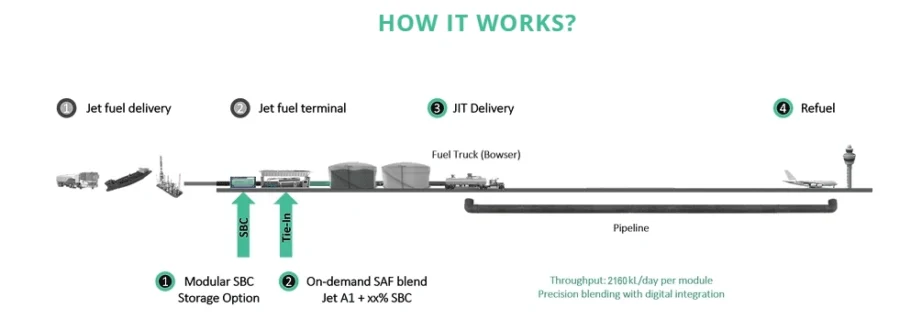
The startup partners with airports and deploys modular assets for easy integration with existing fuel farms and replaces them with SAF at zero scale-up costs. It also offers on-demand fuel blending to improve flexibility and refuel time with precision and safety. This enables FLYORO TECHNOLOGIES to eliminate excess supply chain costs and reduce carbon emissions for the aviation sector.
2. Autonomous Flights
Autonomous flights, enabled by technologies like AI and intricate controllers, are advancing air travel. They enhance operational efficiency, optimize routes, and improve safety using AI-driven decision-making.
By enabling autonomous travel, the airline industry focuses on delivering safety, efficiency, and cost savings by remotely operating flights in cargo delivery, military applications, and urban air mobility.
Airlines are also exploring the technology’s potential to redefine traditional operations and provide more reliable, efficient, and passenger-centric services. By reducing the dependency on human intervention and streamlining processes, autonomous flights positively impact airline operations, ultimately contributing to a safer, more efficient, and customer-friendly aviation landscape.
The global autonomous aircraft market is expected to grow at a CAGR of 32.40% from 2024 to 2035. In 2024, Airbus successfully conducted test flights of the A350-1000 widebody airliner, achieving fully autonomous taxi, takeoff, and landings.
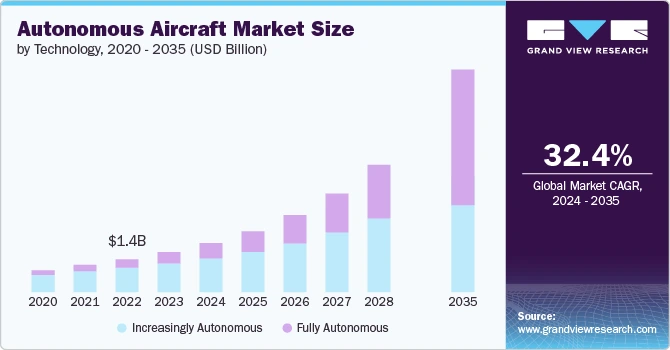
Credit: Grand View Research
AHYRES offers Unmanned Aerial System (UAS) Solutions
Spanish startup AHYRES provides autonomous UAS inspection solutions for remote infrastructure inspection. It incorporates autonomous navigation technology and proximity sensors to enable auto-pilot operations. Also, the startup utilizes hydrogen propulsion and an all-electric system to offer sustainable traveling and reduce environmental impacts.
Further, the startup offers specialized planning software to execute autonomous flights with data capture maneuvers and real-time onboard processing to reduce data transmission. AHYRES caters to the airline industry by providing emission-free and autonomous long-range flight solutions.
Pentaxi builds Autonomous eVTOL Aircrafts
Pentaxi is a startup from Israel that manufactures autonomous, electric vertical take-off and landing (VTOL) passenger and cargo aircraft. It offers PentaxiPass, an eVTOL thrust-vectoring air vehicle with multiple rotating electric motors that carry up to four passengers. Also, PentaxiGo e-Go3, e-Go5, and e-Go10 are autonomous air vehicles for cargo and logistic operations.
These aircraft offer accelerated and flexible mobility in both shorter and longer commutes with business-class comfort and cost and energy efficiency. Pentaxi aids private passengers, commercial flight users, and the logistics industry by providing zero-emission autonomous urban air mobility.
3. 3D Printing
The airline industry has seen significant advancements with the integration of 3D printing technology. 3D printing, also known as additive manufacturing, plays a crucial role in aircraft construction and maintenance. It enables the production of complex and lightweight components, contributing to improved fuel efficiency and overall performance. The process involves creating three-dimensional objects from digital models by layering materials, allowing for intricate designs that were difficult to achieve with traditional manufacturing methods.
Airlines also leverage 3D printing to produce replacement parts on demand, reducing downtime and costs associated with rare and obsolete parts. Additionally, 3D printing offers flexibility in customizing cabin interiors, enhancing passenger comfort and experience. As the technology continues to evolve, it holds the potential to streamline supply chains, reduce waste, and drive innovation by transforming how aircraft are built and maintained.
Apex Aeroprecision manufactures 3D-Printed Aircraft Interiors
US-based startup Apex Aeroprecision designs and manufactures complex, lightweight, business jet and VVIP aircraft interior components. It utilizes additive manufacturing and advanced materials to manufacture aircraft components like composite and aluminum sinks and engineered surfaces.
The startup’s technology thus ensures the manufacturing of strong and physically stable components. Apex Aeroprecision provides aircraft manufacturers with high-quality ready-to-install interior components on demand, thereby reducing lead time and costs.
ANSER AeroNautics and Space provides Integrated Aviation Solutions
Italian startup ANSER AeroNautics and Space builds integrated solutions for the aeronautics and space industries. Their products include rotary-wing aircraft, unmanned aerial systems (UAS), and structures for fixed-wing aircraft and large earth systemsare.
In the space sector, ANSER builds nanosatellites, as well as components and sub-assemblies for satellites and orbiting stations. The company leverages cutting-edge technologies, including additive manufacturing, to deliver high-quality, customized solutions.
The products are suitable for aerospace manufacturers, defense contractors, and space agencies that require specialized, high-tech components and systems.
4. Personalization
Airlines are using passenger data to create more enjoyable and convenient journeys. For this, they are leveraging advanced data analytics and technology to customize services and offerings to individual traveler preferences. This includes tailored in-flight amenities like seat choices and meal options to personalized loyalty program benefits and ticketing suggestions.
Real-time communication through mobile apps and post-travel engagement efforts further enhance the personalized experience. This approach cultivates customer satisfaction and brand loyalty, ultimately leading to increased revenue and sustained growth.
Airlines are focusing on dynamic pricing and tailored travel experiences to boost ancillary revenue and enhance customer satisfaction. The private aircraft market is projected to grow at a CAGR of 7.1% from 2025 to 2029.
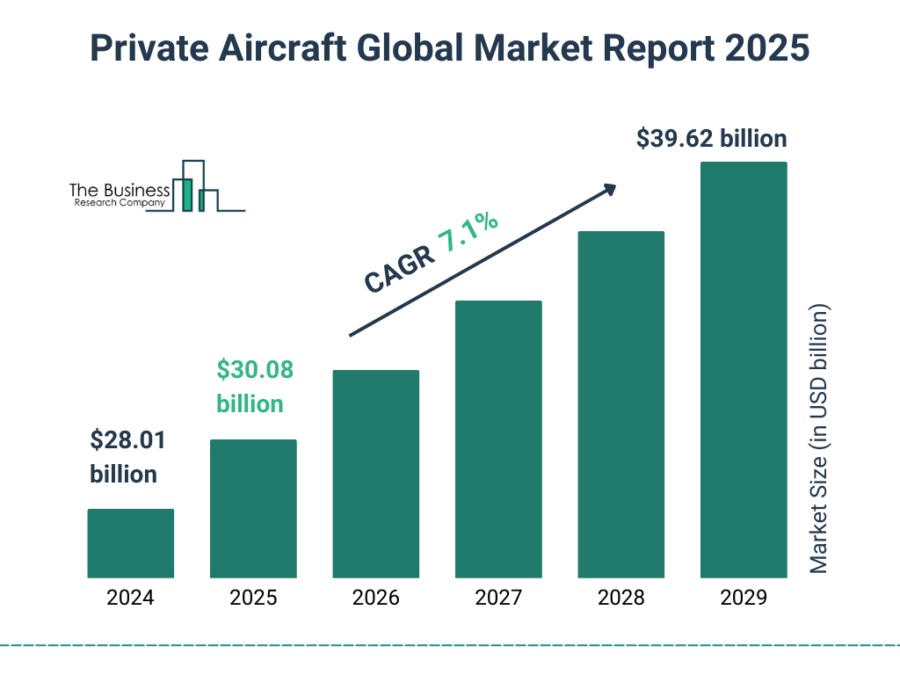
Credit: The Business Research Company
Lincoln Private Jets offers Personalized Jet Charters
US-based startup Lincoln Private Jets offers luxurious customized jet charters on demand. It delivers a personalized experience to meet the needs of travelers by creating a customized travel itinerary. The startup also offers aviation services such as shuttle flights, buying and selling jets, and assistance with on-the-ground experiences.
Hyer Aviation provides Personalized Aviation Solutions
Hyer Aviation is a Dutch startup that offers personalized aviation solutions by providing flexible flight availability and customized management. It delivers on-demand and shared flights for charter requirements and a complimentary flight manager application for flight details and competitive offers.
The startup’s CO2 offset program also allows clients to offset the entire emission of the flights to ensure carbon-neutral travel. By offering on-demand private and group charters, Hyer Aviation improves the flexibility and control of the flight schedule to the clients with personalized convenience and comfort.
5. Blockchain Security
Blockchain technology is reshaping the airline industry by introducing greater transparency, security, and efficiency. It offers a decentralized and immutable ledger for recording transactions, which streamlines various processes within the aviation sector. From supply chain management to aircraft maintenance, blockchain enhances traceability and reduces the risk of fraud.
Further, smart contracts, powered by blockchain, enable automated and secure execution of agreements, benefiting areas like ticketing and baggage handling. The technology also facilitates quicker and more reliable sharing of information between different stakeholders, including airlines, airports, and regulatory authorities.
The global aviation market is expected to grow at a CAGR of 19.60% from 2025 to 2034.
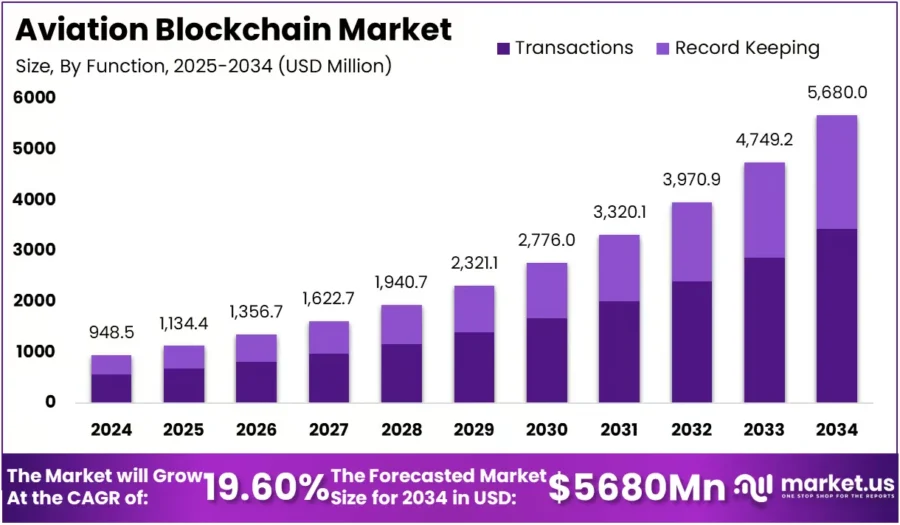
Credit: Market.US
TavelX uses Blockchain for Airline Revenue and Operation Automation
US-based startup TavelX leverages blockchain technology and technical integration to convert plane tickets to NFTicket, increasing customer ownership. It provides an automated and customer-centric retailing model to provide operational automation and security to airlines.
The startup decentralizes the distribution of airline tickets through blockchain and smart contracts, allowing customers to take ownership of their tickets. Also, it enables airlines to maintain control over the sales parameters and use a direct distribution strategy. This increases revenue, reduces costs, and ensures a better customer experience.
Fly Air builds a Private Jet Booking App
US-based startup Fly Air builds a flight booking app that combines blockchain technology and artificial intelligence. The voice-activated AI ensures convenience and the blockchain technology ensures security. Users can book on-demand and receive quotes within very little time. The app comes with credit card processing and electronic wire transfer options.

6. IoT Connectivity
The Internet of Things is enhancing efficiency, safety, and customer satisfaction by connecting aircraft, ground operations, and passenger experiences through a network of interconnected devices and sensors. Airlines are using IoT applications for real-time aircraft condition monitoring and, in turn, enable predictive analytics, optimize flight planning, track baggage, and customize in-flight service.
This enhanced connectivity enables airlines to make data-driven decisions, improve operational processes, and provide passengers with a personalized travel journey. Ultimately, IoT is reshaping the industry’s landscape, making flying safer and more efficient, which enhances overall travel experiences.
The global aviation IoT market size is predicted to increase from USD 12.95 billion in 2025 to approximately USD 81.01 billion by 2034, expanding at a CAGR of 22.67% from 2025 to 2034.
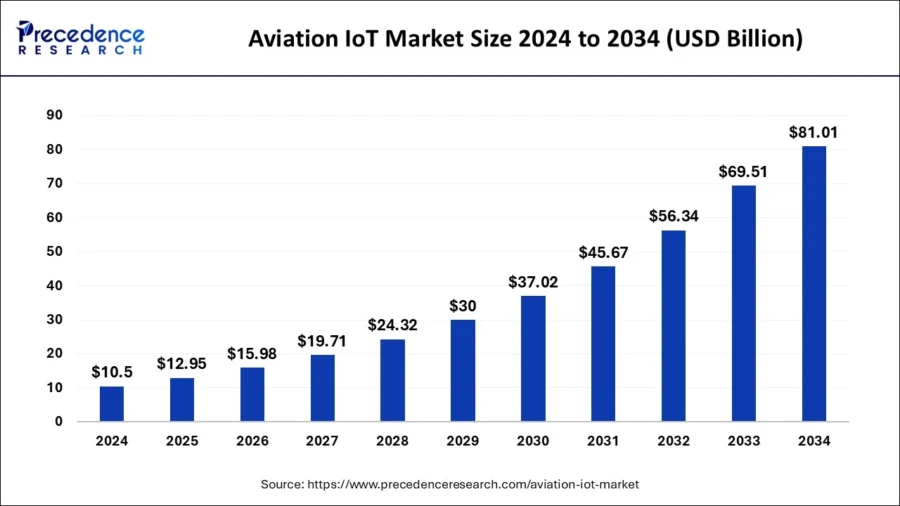
Credit: Precedence Research
Aircraft IoT enables Aircraft Predictive Analysis
Aircraft IoT is a US-based startup that provides predictive analysis of aircraft and maximizes the value of aircraft data. It combines onboard sensors and IoT to improve operational efficiency, reliability, and safety for passengers. The solution also leverages AI and analytics to analyze sensor data.
The startup offers aircraft data monitoring and decoding, safety management systems, as well as predictive and prescriptive maintenance analytics. Aircraft IoT thus caters to OEMs, aircraft owners, and travelers, providing them with better control of aircraft data and a safer flying experience.
Helix Wireless provides Wireless IoT Connectivity for Airplanes
US-based startup Helix Wireless offers wireless IoT connections for real-time monitoring and control. It develops Helix SmartSim, a sim that connects to networks featuring permanent roaming without restrictions. The solution centralizes customer billing in one country to eliminate the need for multiple contract negotiations with multiple providers.
The startup also offers Helix SOLO, a sim management platform that enables remote deployment, management, and monitoring of devices in real-time. Helix Wireless assists airline businesses to improve efficiency in their mobile strategy and consumers to be free from unwanted fees.
7. Immersive Simulations
Immersive technologies are redefining the landscape of the airline industry, offering novel ways to engage passengers, streamline operations, and enhance safety. Virtual reality (VR) and augmented reality (AR) are finding applications in pilot training, maintenance procedures, and passenger entertainment.
Through VR simulations, pilots navigate various virtual scenarios to improve their skills and decision-making. AR further assists ground crews by overlaying real-time maintenance information onto aircraft components, thereby reducing downtime.
For passengers, VR and AR provide interactive in-flight entertainment, offering travelers a more engaging experience. Additionally, these technologies aid in the visualization of complex data, contributing to improved flight planning and navigation. As the airline industry embraces immersive simulations, it will create more efficient operations and elevate passenger satisfaction.
Vancouver International Airport has developed a digital twin called the Situational Awareness Module that provides real-time visibility of passenger movements through the terminal, helping operations teams identify and address congestion points.
DigiLab Solutions implements Machine Learning Workflows for Digital Twins
UK-based startup DigiLab Solutions builds twinLab, a platform to implement machine learning workflows for digital twins. It utilizes self-learning algorithms to build real-time emulators for aircraft engineering. Unlike conventional methods that require vast amounts of data, twinLab produces surrogate models of real-world scenarios to make predictions and inform decision-making.
twinLab also quantifies uncertainty to offer a safety-critical setting in aircraft design. Further, it recommends the next points to collect data for, which reduces design cycles and leads to a viable surrogate model quickly. This allows airline businesses and engineers to leverage a safety-first approach in aircraft development, ensuring passenger safety.
Eresha builds a VR Platform for Aviation Training
Indian startup Eresha develops a platform for training simulations. The platform combines aviation technology, virtual reality, mixed reality, and artificial intelligence to address challenges in the aviation industry. The platform is suitable for the aviation as well as the defense sector. It is useful for employee training, improving safety standards, and optimizing various aviation operations.
8. Location Intelligence
By harnessing data from various sources, airlines optimize routes, schedules, and operational strategies. Through these navigational insights, carriers improve fuel consumption, reduce flight delays, and enhance passenger experiences. Moreover, location intelligence aids airlines in identifying new market opportunities and tailoring their services to specific regions.
This technology also plays a critical role in crisis management and contingency planning, enabling airlines to respond swiftly to disruptions. With precise geospatial information, the industry benefits from increased operational accuracy, reduced costs, and improved overall performance, elevating airline experiences for passengers and stakeholders.
Lufthansa uses Bluetooth beacons at Munich Airport to deliver personalized offers to passengers, such as business lounge access or seat upgrades, based on their location within the airport.
PortaPilot develops Clamp-On Autopilot Systems
US-based startup PortaPilot makes clamp-on autopilot systems for aircraft to provide autonomous and stress-free flight. It utilizes a plug-and-play servo module to connect to flight controls and offers the flexibility of removal at any time. The startup develops PortaPilot NAV and PortaPilot VNAV – its multi-axes autopilot control systems that work with standalone or external GPS to provide waypoint navigation.
These systems use a GPS flight plan for autonomous operations and altitude holding. It enables wing leveling, heading hold, flight plan tracking, and course reversal. PortaPilot thus allows new and existing aircraft to switch to autopilot operations without any modifications.
Aeroficial Intelligence offers Smart Air Traffic Analytics
Austrian startup Aeroficial Intelligence delivers smart air traffic analytics. It combines data analytics and AI to empower air traffic management institutions and airports with operational insights and situational awareness. The startup also offers Performance Cockpit, a digital platform that offers a range of software modules to save emissions and generate new insights on air traffic operation.
The platform provides maps to visualize flight and airside trajectories as well as offers a range of filtering capabilities and KPIs, detours, go-arounds, and delays. This improves airspace efficiency measurements, flight visualization, root cause analysis, and infrastructure bottleneck identification. Aeroficial Intelligence thus allows airports, pilots, and maintenance crew to reduce emissions, improve predictability, and report functionality.
9. In-Flight Entertainment
IFE encompasses a range of entertainment options, including movies, TV shows, music, games, and more, provided to passengers during their flights. This amenity not only serves to alleviate the monotony of long journeys but also enhances customer satisfaction and loyalty. With novel technologies, airlines are delivering personalized content, seamless streaming, and even interactive experiences.
Such entertainment solutions keep passengers engaged and also provide airlines with opportunities for additional revenue streams through advertisements and premium content offerings. In-flight entertainment has also become a competitive differentiator for airlines, contributing to their brand image and overall passenger comfort.
Some airlines are exploring the use of VR headsets for in-flight entertainment, allowing passengers to watch 3D movies, play immersive games, or even experience virtual dreamscapes to help them sleep better during flights.
ProVerne Solutions simplifies Connected Passenger Management
US-based startup ProVerne Solutions provides passenger experience solutions such as connected cabins, crew mobile, and IFE touchpoints. It collates data from passenger service systems, loyalty programs, crew management, and media providers to create seamless and immersive passenger experiences.
The solution features centralized passenger preferences, integration with IFE systems and loyalty programs, and content management systems. ProVerne Solutions offers device-agnostic solutions to provide wide access through standard web or mobile browsers, eliminating the need for additional software installations. This allows airlines to attract more customers and retain brand loyalty.
21 Aero provides In-Flight Entertainment and Systems Integration
UK-based startup 21 Aero provides IFE and systems integration services for the airline industry. It offers USB power solutions, harness manufacturing, seat modifications, and blanking panel manufacturing to ensure a better in-flight experience for passengers. The power solutions provide reliable and efficient charging options for passengers’ personal devices, ensuring they are connected and entertained throughout the journey.
The USB power outlet also features over-current and temperature protection, short circuit protection, and under-performance protection to enable a safer and smoother operation. 21 Aero caters to aerospace agencies, defense contractors, and government agencies by providing in-flight entertainment solutions to enhance and improve customer satisfaction.
10. Biometrics
Biometric authentication methods, such as fingerprint, facial, and voice recognition, are key tools used to verify and authenticate passengers’ identities at various touch points throughout their journey. These advanced identification techniques ensure convenience, speed, and enhanced security, streamlining processes like check-in, boarding, and immigration.
Airlines and airports are increasingly adopting biometric systems to create a seamless and frictionless travel experience, reducing waiting times and enhancing operational efficiency. Beyond passenger authentication, biometrics play a crucial role in bolstering air transport security, ensuring that only authorized individuals have access to sensitive areas.
NeoKe develops Digital Identity Solutions
NeoKe is a Dutch startup that offers digital identity solutions for the travel ecosystem. It combines cryptographic and biometric technology to enable travelers to control their own data, creating a secure platform for exchanging information with the providers. Its NeoKe Wallet, a personal digital wallet, securely stores individual data. Also, Neoke Connect, an identity platform, integrates with existing systems to support log-in, check-in, and data management.
The startup utilizes self-sovereign identity and decentralized identifiers to support risk-rating, verification, and access for individuals. NeoKe caters to travelers and travel providers by providing a streamlined and secure way to share identities for smoother and more positive guest experiences.
Falco Systems improves Aviation Security
US-based startup Falco Systems provides aviation security systems to increase safety and improve business processes in the aviation industry. It leverages biometrics for boarding customers, integration with customs and border patrol (CBP), and traveler support. The solution offers on-site support of the biometric units to enable faster maintenance and reduce boarding wait times.
Also, the solution allows airlines to integrate biometric access to lounges and provide a seamless passenger experience from curb to gate. Falco Sytems enables airports and travelers to use digital identity and facial recognition as access to touchpoints, creating fast and safe travel experiences.
Discover all Future Trends in the Airline Industry
The airline industry is undergoing a significant transformation with the introduction of new technologies, innovative business models, and changing customer expectations. From the adoption of AI and IoT to the use of SAF and the development of supersonic jets, airlines are constantly pushing technology-driven innovations.
As we look to the future, technologies such as AR and VR will continue to evolve and adapt to meet the needs of the modern traveler. The Trends in the Airline Industry outlined in this report only scratch the surface of trends we identified during our data-driven innovation & startup scouting process. Identifying new opportunities & emerging technologies to implement into your business goes a long way in gaining a competitive advantage.
The Airline Industry Trends & Startups outlined in this report only scratch the surface of trends that we identified during our data-driven innovation & startup scouting process. Identifying new opportunities & emerging technologies to implement into your business goes a long way in gaining a competitive advantage.
